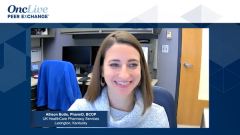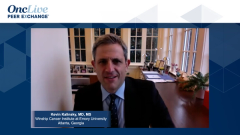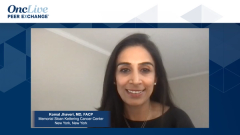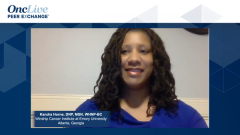
ADC Treatment Options and Clinical Data in Breast Cancer
An overview of antibody-drug conjugate therapies available for patients with metastatic breast cancer and triple-negative breast cancer based on outcomes demonstrated in clinical trials.
Episodes in this series

Kevin Kalinsky, MD, MS: Komal, talk us through the ADCs [antibody-drug conjugates] that are available. I mentioned metastatic disease, but we also have approval for TDM-1 [trastuzumab emtansine] in the adjuvant setting. Talk us through some of these agents and what their indications are for.
Komal Jhaveri, MD, FACP: They’ve helped us transform the care for our patients, both in the metastatic setting and, as you mentioned, in the early state setting. The first excitement for our patients and approval for our patients was for HER2 [human epidermal growth factor receptor]–positive metastatic cancer with the prototype antibody-drug conjugate—a first-generation antibody-drug conjugate—TDM-1, or ado-trastuzumab emtansine. It had a maytansinoid payload, and the approval was initially based on the phase 3 EMILIA trial, which compared ado-trastuzumab emtansine with lapatinib and capecitabine, which was the standard of care when we were looking at TDM-1 [trastuzumab emtansine] for HER2+ metastatic breast cancer. That led to a significant improvement in progression-free and overall survival and to the approval of TDM-1 [trastuzumab emtansine].
It’s also shown activity for patients who had not received TDM-1 [trastuzumab emtansine] in the second-line setting based on the TH3RESA trial, when TDM-1 [trastuzumab emtansine] was compared with physician’s choice of chemotherapy. That’s something we got familiar with. It’s very well tolerated. There’s no hair loss. We see some fatigue. The most important dose-limiting toxicity that we see or had seen was thrombocytopenia, which is what we see as well. We see some elevations in liver function tests, and some patients struggle with neuropathy.
In the metastatic setting, we now have approval for the next generation of antibody-drug conjugates being developed. The 1 that has been truly successful and is already implemented in our standard of care has been trastuzumab deruxtecan. The deruxtecan is a TOP1 inhibitor payload. When we think about the drug-to-antibody ratio—how many molecules of chemotherapy are we delivering to a cancer cell when this conjugate attaches to the target protein—the trastuzumab deruxtecan delivers about 8, compared with TDM-1 [trastuzumab emtansine], which delivers about 3.5. There differences in the link technology, as Allison pointed out, which is really important, but there are also differences in the payloads within these newer-generation ADCs and differences in the drug-to-antibody ratios.
We have data for justifying trastuzumab deruxtecan in the third-line-and-beyond setting from the DESTINY-Breast01 trial, but we also have the first randomized data comparing T-DXd, or trastuzumab deruxtecan, with TDM-1 [trastuzumab emtansine] based on data from the DESTINY-Breast03 trial that were presented at ESMO [European Society for Medical Oncology]. There was an unprecedented improvement: the hazard ratio was 0.28 with P value of 10-22. That’s something we haven’t really seen in breast cancer, let alone HER2+ breast cancer. So that’s exciting.
Certainly the toxicity is slightly different. We see more nausea and fatigue. Important AEs [adverse effects] of interest have been interstitial lung disease and pneumonitis. We saw a lot more of that in the DESTINY-Breast01 trial in heavily pretreated patients. Fortunately, there were no grade 4 or 5 events of those in the DESTINY-Breast03 trial, but it’s something we continued to see with this agent, which we need to be vigilant about.
As you pointed out, we also have data from the KATHERINE trial, which justifies using TDM-1, trastuzumab emtansine, in early stage HER2+ disease. Patients who had neoadjuvant chemotherapy and still have residual disease at the time of surgery can justify receiving TDM-1 [trastuzumab emtansine] instead of continuing their anti-HER2 therapy, given the 3-year invasive disease survival benefits of 11%. It improved from 77% in the control arm with a trastuzumab-containing regimen to 88% in the TDM-1 [trastuzumab emtansine] arm. That’s our standard of care. We do have clinical trials comparing T-DXd [trastuzumab deruxtecan] with TDM-1 [trastuzumab emtansine] to see if that might transform our standard of care, but that’s what we use for now.
To touch upon what we have approval for with metastatic triple-negative breast cancer, we have a TROP2-directed antibody-drug conjugate, sacituzumab govitecan. That’s already approved for patients with metastatic disease who’ve had up to 2 lines of therapy, at least 1 with taxane in the metastatic setting. Those patients can receive sacituzumab govitecan, which is given on days 1 and 8 of a 3-week cycle. We see a little neutropenia, diarrhea, and fatigue as adverse effects. It’s very exciting that we have approval and efficacy for these agents for both subtypes of breast cancer.
Kevin Kalinsky, MD, MS: We’ll go into some of the granular details about the responses and some of the toxicity we see. As you mentioned, with sacituzumab govitecan, to see the response rates that we see certainly has changed and added to our armaments of agents. Before we move on to a case, Kandra, from your perspective in clinic, tell us the utilization and development of ADCs and how these have impacted the treatment of breast cancer.
Kandra Horne, DNP, MSN, WHNP-BC: It’s been amazing. The development of these anti-HER2 agents and ADCs has been 1 the most meaningful advancements in the management of metastatic breast cancer. It has been amazing to see significantly improving survival outcomes for our patients.
Kevin Kalinsky, MD, MS: Absolutely. You can completely change how the landscape is evolving, especially in this residual disease setting, which we’ll focus on in our next case.
Transcript edited for clarity.






































